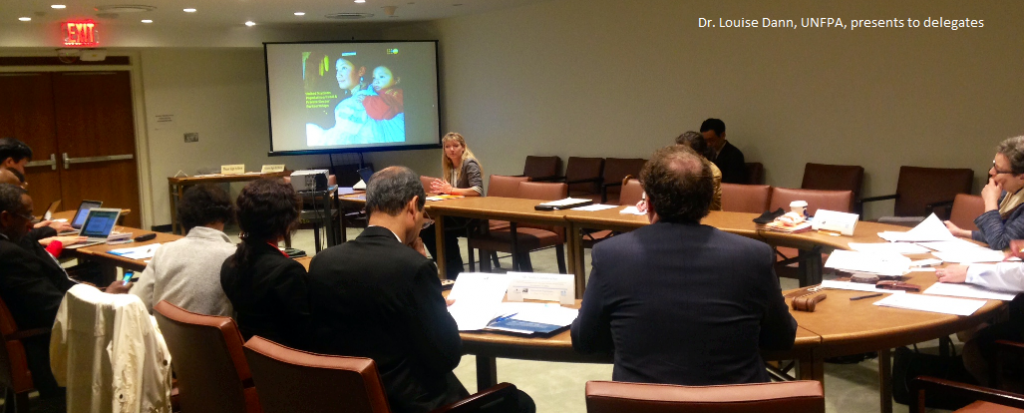Course on Public-Private Partnerships and Sustainable Development
02 June 2015, New York, USA – Course on Public-Private Partnerships and Sustainable Development, conducted by United Nations Institute for Training and Research (UNITAR), New York Office, with presenters from United Nations Department of Economic and Social Affairs (UN DESA), UN-Habitat, United Nations Division for Ocean Affairs and the Law at Sea (DOALOS) and United Nations Population Fund (UNFPA). Also participating were Project Concern International (PCI), United Nations Foundation, and Public-Private Alliance Foundation (PPAF).
This unique multilateral training course aimed to build capacity for diplomats preparing for negotiations that incorporate multi-stakeholder partnerships. The course focused on ways to boost synergies of Public-Private Partnerships (PPP) for sustainable development impact and investment. Particularly, it guided the participants on how these partnerships are best structured to enhance social responsibility and advancement of business. Furthermore, it focused on how to measure the value and sustainability of results.
Dr. Yvonne Lodico, Head, UNITAR New York Office, underlined the importance of PPPs in enhancing sustainable development before the Deputy Permanent Representative of Bulgaria, H.E. Dr. Boyan Nedialkov Belev, stated that PPPs are naturally medium to long term engagements between the public and private sectors whereby some of the service responsibilities of the public sectors are provided by the private sectors, with clear conformity on shared objectives for delivery of public infrastructure or services. While PPP is not a new concept, it aims to provide the best elements of public and private practices. Dr. Louise Dann, private Sector partnerships, UNFPA, commenced the morning presentations with insight into what shapes the types of organizations for partnership consideration, and what type of engagement to enter into, In particular, this raised the important issues of values alignment and reputation risk when considering PPP. This was followed by Ms. Yamina Djacta, Director, UN-Habitat New York Office, who used pertinent example to emphasise the need for clearly defining roles and responsibilities in PPP and multi-stakeholder arrangements.

Mr. François Bailet, Capacity-building Coordinator, DOALOS, shared how PPP can be applied in narrow-focused and specialised fields such as of Law of the Sea. Using the example of PPP use in port operations and shipping cargo inspections, usually an exclusive government function, he demonstrated how PPPs applied with motivation, transparency and due diligence could be used to develop and build capacity.
Dr. Nikhil Chandavarkar, Chief of Communication and Outreach, Division of Sustainable Development, UN DESA, finished the morning session with a recap on how and why private sector knowledge and resources should be considered by governments to assist in addressing the infrastructure space. In particular, he explained the importance of infrastructure to economic growth, the gap that should be stipulated within the existing supply for infrastructure services, and challenges that UN DESA have in addressing this gap. He presented the PPP concepts, its significant features, and types of contractual engagements which reflect the extent of the private sector’s participation. Importantly, Dr. Chandavarkar expanded the discussion to consider PPPs as a component of multi-stakeholder engagement in partnerships for development, and the importance of having a mechanism for measuring PPP success; in particular, when aligning partnerships to Sustainable Development Goals (SDGs).
In the afternoon workshop, Mr Richard Parker, Vice President, Marketing and Communications, PCI, emphasised the role of local engagement and community involvement in the PPP process. While global development is a goal, and more businesses are getting involved in PPPs, businesses still need to make a profit. Most PPPs tend to be community-led with results being passed back to those communities.
Mr. Robert Skinner, Executive Director, New York Office Operations and United Nations Relations, UN Foundation, provided a presentation on his organization’s development and workings. In particular, UN Foundation connects the UN’s work with supporters around the world; mobilizing engaged global citizens, businesses, and non-governmental organizations to support the UN’s leadership on global problem-solving without actually having people ‘on the ground’. He also discussed how PPPs fit into the SDGs.
The afternoon session concluded with a presentation from Mr. David Stillman, Executive Director, PPAF, who encouraged a business approach to PPPs, a ‘think global, act local’ philosophy, and the utility of the UN Global Compact’s Ten Principles when engaging companies in PPPs and multi-stakeholder partnerships. He provided pertinent examples from his recent work in Haiti that could be adapted to other regions.
When undertaking PPPs, all presenters agreed that patience and perseverance were required. PPP implementation often takes years, during which organizations and players change. There is also a need for flexibility. Different participants have different approaches; and while not all participants have a common method or motive, all must have a common, clearly defined goal.
Through presentations and discussion from practitioners of PPP, from UN organizations and NGOs officers with field experience, delegates learnt from professionals with first-hand experience about the opportunities and challenges of creating and maintaining effective PPPs. Through active participation and networking, delegates reported a greater understanding of PPP, its benefits towards sustainable development and an effective engagement approach to PPP and multi-stakeholder engagement.

